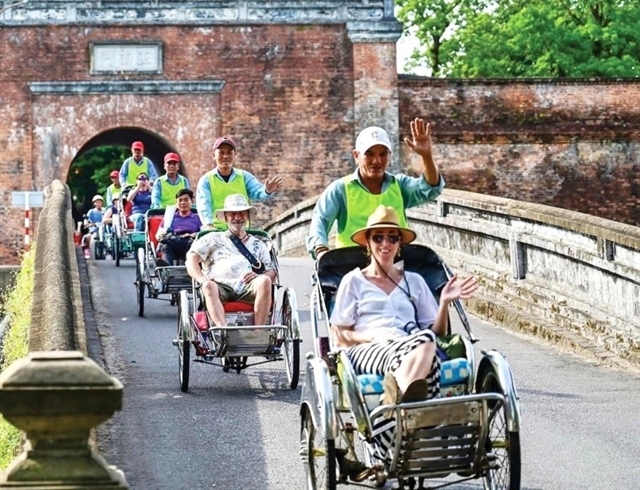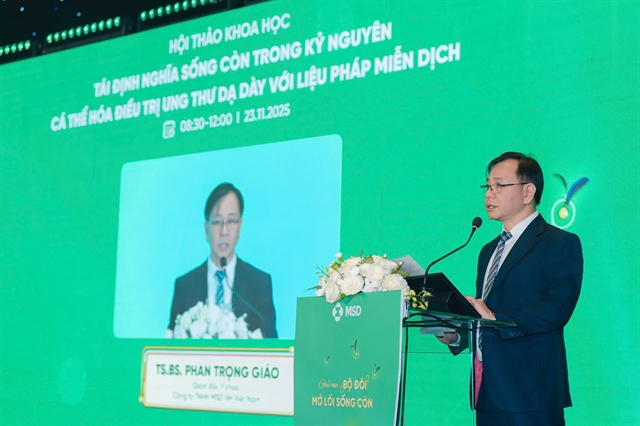 Society
Society

HCM CITY — Leading experts from top hospitals in the country as well as international speakers gathered at the scientific symposiums "Redefining Survival in the Personalised Future of Gastric Cancer Treatment with Immunotherapy" organised in HCM City and Hà Nội.
The symposiums, which were jointly organised by MSD Vietnam (known as Merck & Co., Inc., Rahway, N.J., USA in the United States and Canada) and Hanoi Medical University, are in recognition of Stomach Cancer Awareness Month.
The event brought together leading experts from top hospitals including K Hospital, Chợ Rẫy Hospital, University Medical Centre HCM City, HCM City Oncology Hospital, 108 Military Central Hospital, along with two international speakers, to discuss the latest advancements in personalised treatment, strategies that are changing the approach to gastric cancer management worldwide.
Gastric cancer remains a leading cause of death globally, claiming the lives of hundreds of thousands of people each year.
With the message "Unlock the Duo – Extend Survival", the symposiums highlighted the role of HER2 (Human Epidermal Growth Factor Receptor 2) and PD-L1 (Programmed Death-1) from diagnosis, testing and pathology to applications in personalised gastric cancer treatment. The 'professional duo' model, the close collaboration between treating physicians and pathologists, ensures sample quality, testing accuracy, and optimal protocol selection for each patient.

|
| With the message "Unlock the Duo – Extend Survival", the symposiums highlighted the role of HER2 and PD-L1 from diagnosis, testing and pathology to applications in personalised gastric cancer treatment. — Photo by Huy Vũ |
According to GLOBOCAN 2022, globally there were nearly 969,000 new cases of gastric cancer, with Việt Nam recording approximately 16,277 new cases and 13,264 deaths annually. These numbers show a particularly large disease burden. Enhancing the understanding of signs, risk factors, and the importance of early diagnosis is the foundation for improving treatment outcomes.
Dr. Phan Trọng Giáo, Medical Director of MSD Vietnam, said: "Cancer remains one of the greatest global health challenges. At MSD, we put patients at the centre of everything we do, and we strive to expedite the delivery of therapeutic advances to them as quickly as possible. Over the past decade, MSD's immunotherapy has opened up quality survival hope for millions of patients. This symposium continues MSD Vietnam's long-term commitment, partnering with the healthcare sector for nearly 30 years. The participation of two international professors along with many leading domestic experts brings multidimensional perspectives and valuable practical experience. We believe that every cancer patient deserves more treatment options to enhance both survival chances and quality of life."

|
| Dr. Phan Trọng Giáo, Medical Director of MSD Vietnam, shared the 10-year journey of MSD’s immunotherapy and its impact in saving millions of patients’ lives. — Photo by Huy Vũ |
Early-stage gastric cancer often has no clear symptoms. Some warning signs include: pain or discomfort in the upper abdomen, bloating, heartburn, nausea, vomiting blood, weight loss, and black stools. Research shows that 70 per cent of patients in Việt Nam are diagnosed at late stages.
When the disease progresses to advanced stages, tumors can spread widely, invading neighbouring organs, causing severe pain, dysphagia, malnutrition, edema, abdominal fluid accumulation, and serious deterioration of body function.
Currently, cancer immunotherapies and HER2-targeted drugs have opened clear survival opportunities, especially for patients with advanced stages. Early recognition, appropriate prevention, regular screening along with applying evidence-based medical advances are key factors. These strategies not only help improve survival chances but also enhance life quality for cancer patients in Việt Nam.




